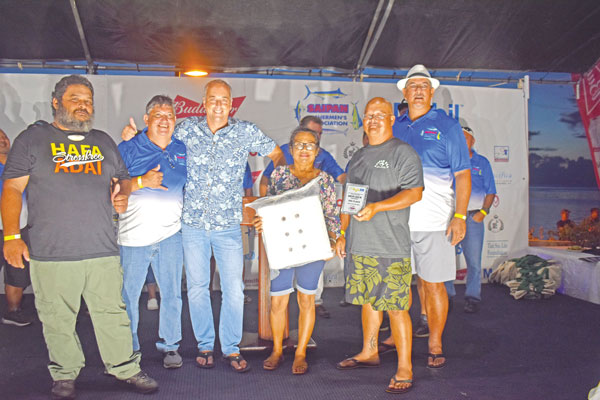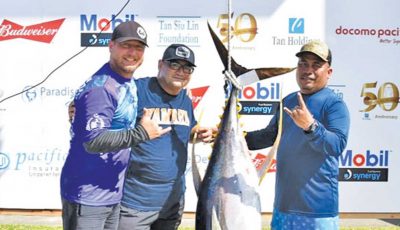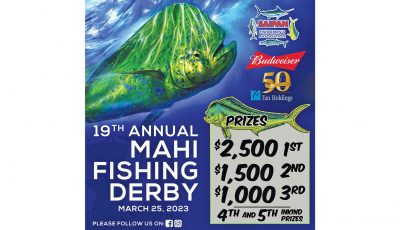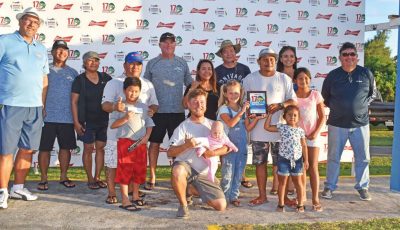SFA opposes gillnet fishing
TTT leaders also oppose bill in personal level

Saipan Fishermen’s Association president Tony Scragg, second from left, poses with skipjack trophy sponsor Pacific Rim Land Development, LLC and its president Keith Stewart and one of the winners of the category during the awards ceremony for the 37th Annual Saipan International Fishing Tournament held in July 2021 at the Aqua Resort Club poolside. (MARK RABAGO)
The Saipan Fishermen Association is opposing a bill that seeks to authorize the use of gillnets, locally known as “tekking,” on Saipan and the Northern Islands.
“This has been a topic of discussion during our recent meeting and the consensus among our officers and members is that we are firmly opposed to this bill. We feel it would be harmful to our fish stocks in the lagoon and especially to turtles, rays, and reef sharks,” said SFA president Tony Scragg.
SFA is composed of about 25 members and around 12-15 boats.
House Bill 23-5, introduced by Rep. Denita K. Yangetmai (D-Saipan), is now before the House of Representatives Natural Resources Committee.
Fisherman Gene Weaver, who heads the non-profit Tasi To Table, said he’s against all forms of gillnet legislation.
“If this bill is passed not only will we see a decline in fish stocks, we’ll also see declines in revenues from gas stations (fuel, oil, lubes), tackle shops (rod and reels, lines, hooks, etc.), boat registrations, most importantly tourists when tourists come to visit our island. Our promotions show pristine waters, the waters are not pristine without marine life,” he said.
Weaver, who said his opinion is as a private citizen and not as president of Tasi to Table, added thorough research should take place prior to any introduction of such a bill.
He also believes the Division of Fish and Wildlife may not even be able to effectively enforce the new bill legalizing gillnet use.
“With the financial situation we are currently in we know there’s no funding for enforcement. With the surveys, petitions and interviews, the majority is against this legislation. I hope our elected leaders can see the impact of this bill on our fish stocks, environment, coral reefs, marine life, economy, tourism…if passed. As a fisherman, father, and grandfather I am 100% against the bill.”
Tasi to Table vice president Dan Wolack agrees with Weaver.
“Every officer in Tasi to Table is very against gill net fishing. However, as a non-profit we try not make official positions on matters like this but are fighting this bill on a personal level as a concerned citizen.”
He said they are also educating their students on this bill and letting them draw their own conclusions.
“We’re encouraging them to make their voices heard as they are our future and this bill could have a huge impact on their futures.”
Floyd Masga, former Western Pacific Regional Fisheries Management Council coordinator, said he opposes the bill as a private citizen.
“There are already provisions with DFW to grant special permits. However, gillnets are harmful and do not discriminate what they catch,” he said.
Mariana Islands Nature Alliance executive director Roberta Guerrero earlier opposed the legislation, saying it will have an immediate and long-lasting negative impact on Saipan’s lagoon ecosystem.
“Although there is a perception that this method of fishing is sustainable, it is not, and not only fish will be affected; coral, seagrass, our shorelines, and our children’s resources will be negatively impacted,” she said in her comments to the bill.
An online petition, authored by former Tasi To Table vice president Wayne Pangelinan, opposing the bill is also slowly gaining a lot of support.
As of March 7, over 1,500 have signed the petition at: https://www.change.org/p/no-to-gillnet-fishing-in-the-cnmi-stop-hb-23-5?signed=true.
“Today we see marine life thriving. Placing gillnets will affect not only fish populations, but also our coral reefs and others. The bycatch alone is for any targeted species, this will catch all!” said Pangelinan
A gillnet is a wall of netting that hangs in the water column, typically made of monofilament or multifilament nylon.
Gillnetting has been a major source of mortality for all sea turtle species, Pangelinan added.
“Turtles encountering a gillnet can quickly become entangled around their head or flippers as they try to escape. Entangled turtles will drown if held under the water but have a higher chance of survival if they can reach the surface to breathe. The nylon can tighten around the turtle’s soft body parts and cause deep cuts potentially leading to infections, limited movement, or complete loss of the limb. Limited use of appendages can impair a turtle’s natural feeding, breathing, and swimming behavior,” he said, citing various sources.



























